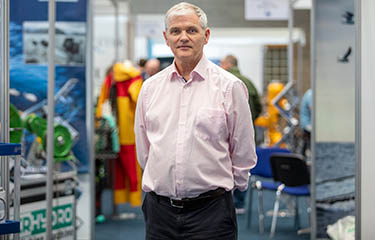The Irish Fish Producers Organisation is fighting back against what it deems to be unfair treatment by the European Union, Norway, and the Irish government.
Facing what it says is a 30 percent decline in catches post-Brexit, IFPO wants government to use “innovative ways” to increase the national fishing quotas allotted to Ireland by the E.U. These include negotiating long-term leases on valuable quotas from other E.U. members like France and Spain, according to IFPO CEO Aodh O’Donnell.
“[They] are unable to catch their massive quota allocation in species such as langostines and monkfish,” O’Donnell said.
IFO wants the Irish government to negotiate the suspension of blue whiting quotas allocated by the E.U. to Norway, which is not an E.U. member. According to O’Donnell, the quota allotted annually to Norway is 37,500 metric tons.
“[It’s] a deal in which Norway ends up with a quota of 9.2 times the Irish quota, most of which is accessed and landed from Irish waters,” O’Donnell said.
Ireland ceded 40 percent of its quota under Brexit negotiations, according to the IFPO. The reduction prompted the Irish government to offer an EUR 80 million (USD 79.8 million) funding package to decommission one-third of the nation’s demersal fleet.
O’Donnell said Ireland gets an unfair quota share, pointing to Eurostat data showing the output value of the country’s fish-processing industry fell from EUR 627 million (USD 626.6 million) in 2015 to EUR 325 million (USD 324.8 million) in 2020, a 48 percent decline.
Separately, O’Donnell warned against the expansion of marine protected areas (MPAs) – a priority for the E.U. He called MPAs a threat to his members, though Ireland’s government is expected to introduce legislation expanding the reach of its MPAs in December 2022, with a coalition of Irish environmental groups calling for an expansion of Ireland’s MPAs to cover 10 percent of the country’s territorial waters by 2025 and at least 30 percent by 2030, up from the current total of 2.1 percent.
IFPO also wants the Irish government to release E.U. fuel subsidies, putting Irish trawlers at a disadvantage, since other E.U. vessels receive up to EUR 0.30 (USD 0.30) per liter in financial assistance.
And O’Donnell called for a moratorium on wind-farm development in the Irish Sea, an area of ocean he called “highly productive.” Development of wind projects in the sea will threaten those fishing grounds, harm fishing stocks and biodiversity, and a “loss of access to a low carbon-footprint foodsource.”
“Fishers have a concern around marine ecosystem impacts short-term and long-term and possible biodiversity loss, seabed impacts on species such as nephrops, and potential seismic impacts on spawning grounds,” O’Donnell said.
O’Donnell and Brendan Byrne, CEO of the Irish Fish Processors and Exporters Association (IFPEA), raised the issue in a recent meeting with Ireland’s Tánaiste, or deputy prime minister, Leo Varadkar.
According to O’Donnell, the Irish Sea is being “heavily mapped” by developers of offshore fixed and floating wind projects.
“This is occurring without co-location plans and coexistence arrangements with fishers. There is a need for an effective stakeholder consultation process … as there is an urgent need to engage with fisher community in a meaningful and respectful way,” he told SeafoodSource. “[Offshore wind power plans represent] a significant loss of key fishing grounds due to competing spatial pressures, of which offshore wind and marine protected areas are the most significant.”
Irish environmental groups, which have been campaigning for marine protected areas and an end to overfishing, have also expressed shared concerns for the impact of some of the policies being pursued by the European Union and Irish government.
Irish Wildlife Trust Campaign Officer Pádraic Fogarty said while a smaller fleet could make it easier for Ireland to meet its environmental goals, the decommissioning of Irish vessels won't necessarily improve the sustainability of local fishing stocks without a greater effort by the European Commission to set fishing quotas in line with scientific advice.
“[That’s] something which the E.U. has been poor at to-date,” Fogarty said. “The European Commission has been known to deviate from the science, although my impression in recent years is that they are getting better. But generally, it is member-states that work to increase quotas beyond that again.”
The IWF has called for conditions to be attached to the Irish government’s decommissioning scheme – for instance, an end to bottom-trawling, Fogarty told SeafoodSource.
“These didn't happen, so what do taxpayers get in return for the investment?” he said.
Photo courtesy of Irish Fish Producers Organisation







